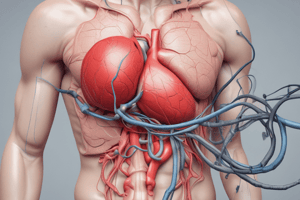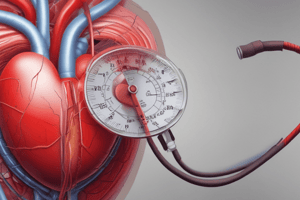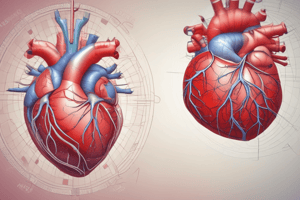Podcast
Questions and Answers
Hemorrhage with a large loss of blood causes _______.
Hemorrhage with a large loss of blood causes _______.
- No change in blood pressure but a change in respiration
- A lowering of blood pressure due to change in cardiac output (correct)
- A lowering in blood pressure due to change in respiration
- No change in blood pressure but a slower heart rate
Given the EDV of 120ml/beat and SDV of 50ml/beat, what is the SV?
Given the EDV of 120ml/beat and SDV of 50ml/beat, what is the SV?
70ml/beat
Select the correct statement of Cardiac Output.
Select the correct statement of Cardiac Output.
A slow heart rate increases EDV, SV and force of contraction
Norepinephrine acts on the heart by ______.
Norepinephrine acts on the heart by ______.
Which structural layer of blood vessels is most responsible for maintaining blood pressure?
Which structural layer of blood vessels is most responsible for maintaining blood pressure?
Which blood vessels lack elastic tissue?
Which blood vessels lack elastic tissue?
In red bone marrow, newly formed blood cells enter the circulation through many _____ type of capillaries.
In red bone marrow, newly formed blood cells enter the circulation through many _____ type of capillaries.
Blood flow is ___ proportional to blood pressure.
Blood flow is ___ proportional to blood pressure.
Blood flow is _____ proportional to the total peripheral resistance.
Blood flow is _____ proportional to the total peripheral resistance.
The pulse pressure is ___
The pulse pressure is ___
Flashcards are hidden until you start studying
Study Notes
Hemorrhage Effects
- A significant loss of blood leads to a lowering of blood pressure due to changes in cardiac output.
Stroke Volume Calculation
- With an End-Diastolic Volume (EDV) of 120 ml/beat and an End-Systolic Volume (ESV) of 50 ml/beat, the Stroke Volume (SV) is calculated to be 70 ml/beat.
Cardiac Output Insights
- A slow heart rate contributes to an increase in End-Diastolic Volume (EDV), Stroke Volume (SV), and the force of contraction in the heart.
Norepinephrine Function
- Norepinephrine accelerates heart function by facilitating quicker attainment of the threshold needed for action potentials.
Blood Vessel Structure
- The Tunica Media layer of blood vessels plays a crucial role in maintaining blood pressure.
Absence of Elastic Tissue
- Capillaries and venules are the types of blood vessels that do not contain elastic tissue.
Capillary Types in Red Bone Marrow
- Sinusoid capillaries are predominantly found in red bone marrow, where newly formed blood cells enter circulation.
Blood Flow Relationships
- Blood flow is directly proportional to blood pressure and inversely proportional to total peripheral resistance.
Pulse Pressure Definition
- Pulse pressure is defined as the difference between systolic pressure and diastolic pressure.
Studying That Suits You
Use AI to generate personalized quizzes and flashcards to suit your learning preferences.




